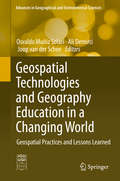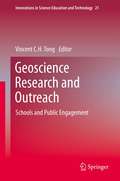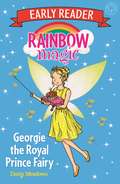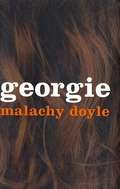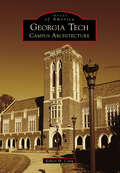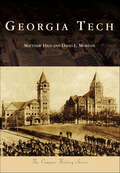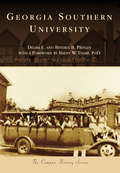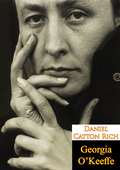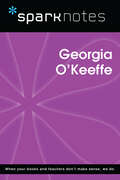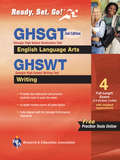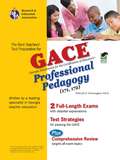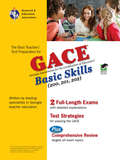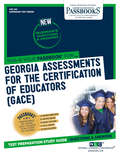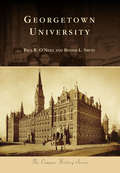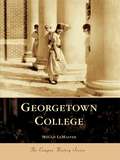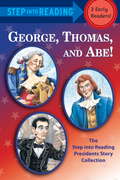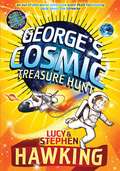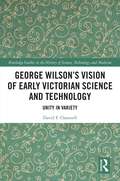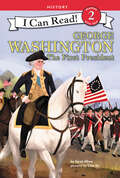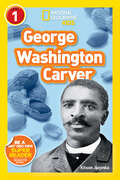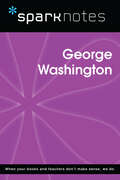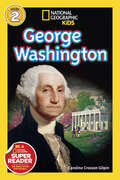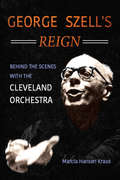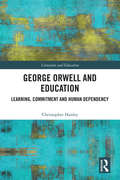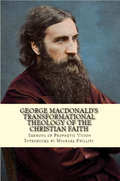- Table View
- List View
Geospatial Technologies and Geography Education in a Changing World
by Ali Demirci Osvaldo Muñiz Solari Joop ScheeThis book is an initiative presented by the Commission on Geographical Education of the International Geographical Union. It focuses particularly on what has been learned from geospatial projects and research from the past decades of implementing geospatial technologies (GST) in formal and informal education. The objective of this publication is to inform an international audience of teachers, professionals, scholars, and policymakers about the state of the art and prospects of geospatial practices (GPs) as organized activities that use GST and lessons learned in relation to geographical education. GST make up an advanced body of knowledge developed by practitioners of geographic information systems (GIS), remote sensing (RS), global positioning systems, (GPS), and digital cartography (DC). GST have long been applied in many different sectors; however, their first use in higher education began in the early 1980s and then diffused to secondary schools during the 1990s. Starting with GIS and RS, it evolved into a much broader context, as GST expanded to include GPS and DC with new communication technologies and Internet applications. GST have been used around the world as a combination of tools and special techniques to make research, teaching, and learning more effective.
Geoscience Research and Outreach: Schools and Public Engagement
by Vincent C. TongFrom energy and water resources to natural disasters, and from changing climatic patterns to the evolution of the Earth's deep interior, geoscience research affects people's lives in many ways and on many levels. This book offers a stimulating cross-disciplinary perspective on the important relationship between geoscience research and outreach activities for schools and for the general public. The contributors - academics, research scientists, science educators and outreach program educators - describe and evaluate outreach programs from around the world. A section entitled Field-based Approaches includes a chapter describing an initiative to engage Alaskan communities and students in research, and another on problem-based learning in the field setting. The Online Approaches section discusses ways to connect students and scientists using online forums; use of the web and social media, including the United Nations University and its experience with the design of a web magazine featuring geoscience research; and video clips on marine geoscience created by students and scientists. The section on Workshop and Laboratory-based Approaches includes a chapter on teaching geochronology to high school students, and another describing an extracurricular school activity program on meteorology. The Program Design section presents chapters on Integrating Geoscience Research in Primary and Secondary Education, on ways to bridge research with science education at the high school level, and on use of online geoscience data from the Great Lakes. The concluding section, Promoting Research-enhanced Outreach, offers chapters on Geoscience Outreach Education with the local community by a leading research-intensive university, and on the use of research to promote action in Earth science professional development for schoolteachers.Geoscience Research and Outreach: Schools and Public Engagement will benefit geoscience researchers who wish to promote their work beyond academia. It offers guidance to those seeking research funding from agencies, which increasingly request detailed plans for outreach activities in research proposals. Policymakers, educators and scientists working in museums, learned societies and public organizations who wish to widen participation will also find this book useful. Together with the companion volume Geoscience Research and Education: Teaching at Universities, this book showcases the key role that geoscience research plays in a wide spectrum of educational settings.
Georgie the Royal Prince Fairy (Rainbow Magic Early Reader #15)
by Daisy MeadowsThese cheerful and inviting Early Readers bring the blast of colour that Rainbow Magic's youngest fans have been waiting for!Rachel and Kirsty are very excited to attend a special royal weekend organised by the Queen! But when the Royal signet ring mysteriously disappears, the girls are in for another fantastic Rainbow Magic adventure! Help Kirsty and Rachel find the royal signet ring before it's too late!'These stories are magic; they turn children into readers!' ReadingZone.comIf you like Rainbow Magic, check out Daisy Meadows' other series: Magic Animal Friends and Unicorn Magic!
Georgie
by Malachy DoyleWith help from a sympathetic fellow resident, a patient teacher, and other staff at a school for emotionally disturbed teenagers, fourteen-year-old Georgie begins to find his way back to sanity.
Georgia Tech: Campus Architecture (Images of America)
by Robert M. CraigThe architectural development of Georgia Tech began as a core of Victorian-era buildings sited around a campus green and Tech Tower. During the subsequent Beaux-Arts era, designers (who were also members of the architecture faculty) added traditionally styled buildings, with many of them in a pseudo-Jacobean collegiate redbrick style. Early Modernist Paul Heffernan led an architectural revolution in his academic village of functionalist buildings on campus--an aesthetic that inspired additional International Style campus buildings. Formalist, Brutalist, and Post-Modern architecture followed, and when Georgia Tech was selected as the Olympic Village for the 1996 Summer Olympics, new residence halls were added to the campus. Between 1994 and 2008, Georgia Tech president G. Wayne Clough stewarded over $1 billion in capital improvements at the school, notably engaging midtown Atlanta with the development of Technology Square. The landscape design by recent campus planners is especially noteworthy, featuring a purposeful designation of open spaces, accommodations for pedestrian perambulations, and public art. What might have developed into a prosaic assemblage of academic and research buildings has instead evolved into a remarkably competent assemblage of aesthetically pleasing architecture.
Georgia Tech (Campus History)
by Matthew HildGeorgia Tech has become one of the nation's top-10-ranked public universities and boasts a former U.S. president, TV personality and Hall-of-Fame athletes among its prominent alumni.From humble beginnings as a small technological institute that opened in 1888, Georgia Tech is now renowned throughout the world for its excellence in technological education and research. A top-10-ranked public university, according to U.S. News & World Report rankings, famous Georgia Institute of Technology alumni include Jimmy Carter, G. Wayne Clough, Jeff Foxworthy, Sam Nunn, Randolph Scott, and Leonard Wood, along with many famous athletes. Georgia Tech has won four national college football championships, the first in 1917 under the legendary coach John Heisman. Today, Georgia Tech has a student body of more than 29,000 at the undergraduate and graduate levels and more than 155,000 living alumni. The institute has an annual economic impact of about $3 billion upon Georgia's economy. Authors and Tech alumni Matthew Hild and David L. Morton take you inside the journey of how this institute got to where it is today.
Georgia Southern University
by Brent Tharp Delma E. Presley Beverly B. PresleyIn 1906, the founders of what would become Georgia Southern University pledged to build a college that would prepare students to succeed in a changing world. The First District Agricultural and Mechanical School served well the needs of women and men who lived in a farm-based economy. As the 20th century unfolded, the college did something that is rare in the history of higher education: it changed its name five times to meet the educational needs of its citizens. A university since 1990, Georgia Southern provides opportunities for a diverse and inclusive student body that now exceeds 20,000. Each year, graduates earn diplomas at the bachelors, masters, and doctoral levels. Today, the road to the future begins on a path that learners long have traveled: it leads up through a green forest to Sweetheart Circle. Old A&M has become one of the nation's distinctive universities. Those who study and teach here say the campus is the most beautiful in America. At its heart is a pair of neatly coupled lakes, framed by historic willows, live oaks, and stately pines. The light of learning still shines brightly from Statesboro's highest hill.
Georgia O’Keeffe
by Daniel Catton RichThis is the definitive book on Georgia O'Keeffe's work--selected, designed, and supervised by the artist herself, with her own text. It includes 108 magnificent full-color plates, some never reproduced elsewhere or publicly shown, and spans O'Keeffe's entire career: from her intense, personal abstractions to her unique depictions of nature--flowers, bones, rocks, and landscapes.
Georgia O'Keeffe (SparkNotes Biography Guide)
by SparkNotesGeorgia O'Keeffe (SparkNotes Biography Guide) Making the reading experience fun! SparkNotes Biography Guides examine the lives of historical luminaries, from Alexander the Great to Virginia Woolf. Each biography guide includes:An examination of the historical context in which the person lived A summary of the person&’s life and achievements A glossary of important terms, people, and events An in-depth look at the key epochs in the person&’s career Study questions and essay topics A review test Suggestions for further reading Whether you&’re a student of history or just a student cramming for a history exam, SparkNotes Biography guides are a reliable, thorough, and readable resource.
Georgia GHSGT ELA & GHSWT Writing with Online Practice Tests: Georgia High School Graduation Test - English Language Arts And Georgia High School Writing Test - Wri (Georgia Ghsgt Test Preparation Ser.)
by J. Brice Dana PassanantiGetting Ready for Georgia Graduation Exams? You need REA's GHSGT English Language Arts & GHSWT Writing Test Prep with Bonus Exams Online! If you're getting ready for the Georgia graduation exams and are concerned about your English Language Arts and Writing skills, don't worry. REA's popular Georgia High School Graduation Test (GHSGT) and Georgia High School Writing Test (GHSWT) takes the confusion out of English Language Arts and Writing while helping 11th grade students prepare for this high-stakes exam. Based on Georgia Performance Standards established by the Georgia Department of Education, our test prep provides the instruction and practice you need to succeed on this important graduation exam. The review features student-friendly, easy-to-follow lessons that reinforce the concepts tested on the official exams. Our test prep is ideal for classroom, group or individual study. Targeted drills and examples increase comprehension while enhancing reading and writing skills. The book contains 2 full-length practice tests that allow you to test your knowledge and reinforce what you've learned. Two additional practice tests not found in the book are available online - for a total of four exams! Each unique practice test features diagnostic feedback and detailed explanations of answers. This book is a must for any Georgia student preparing for the GHSGT & GHSWT graduation exams!
Georgia GACE Professional Pedagogy
by Patrick HanniganGACE Professional Pedagogy Test Prep Puts Georgia Teachers in a Class of Their Own!First Edition! REA's new test prep for the GACE (Georgia Assessments for the Certification of Educators) Professional Pedagogy (171, 172) exam helps teacher candidates get one step closer to teaching in a Georgia classroom. Written by an expert on the content of the Georgia GACE exam, our comprehensive review covers all the necessary skills on both of the GACE Professional Pedagogy tests: Test I - Student Development & Learning and Learning Environment. Test II - Instruction & Assessment, and Professional Roles & Responsibilities. Book comes complete with two full-length practice tests with detailed explanations for every answer, test-taking strategies, a custom study schedule, and more!
Georgia GACE Basic Skills
by Judith Robbins Susan FranksGACE Basic Skills Test Prep Puts Georgia Teachers in a Class of Their Own! First Edition! REA's new test prep for the GACE (Georgia Assessments for the Certification of Educators) Basic Skills (200, 201, 202) exam helps teacher candidates get one step closer to teaching in a Georgia classroom. Written by educators who are experts on the content of Georgia's GACE Basic Skills exam, our test prep features every type of question in every subject area that can be expected on the actual GACE. The comprehensive review covers all the necessary skills in each of the three subject areas of the GACE Basic Skills exam: Reading, Mathematics, and Writing. The book contains two full-length practice tests with detailed explanations for every answer, test-taking strategies, a custom study schedule, and more!
Georgia Assessments for the Certification of Educators: Passbooks Study Guide (Admission Test Series)
by National Learning CorporationThe Admission Test Series prepares students for entrance examinations into college, graduate and professional school as well as candidates for professional certification and licensure. The Georgia Assessments for the Certification of Educators (GACE®) Passbook® prepares you by sharpening the skills and abilities necessary to succeed on your upcoming entrance exam. It provides hundreds of questions and answers in the areas that will likely be covered on your upcoming exam.
Georgetown University (Campus History)
by Paul R. O’Neill Bennie L. SmithGeorgetown University, the oldest Catholic university in America, was founded in 1789 by Archbishop John Carroll, SJ, as an academy for boys that was open to "Students of Every Religious Profession" and "every Class of Citizens." Carroll established the school on a hilltop overlooking the Potomac River, "delightfully situated" as Charles Dickens would observe several decades later. Georgetown welcomed its first student, William Gaston, in 1791 and was chartered by Congress in 1815, but by the time of the Civil War, when Federal troops occupied the campus, the school was on the brink of collapse. It was not until the presidency of Patrick F. Healy, SJ, in 1873 that Georgetown would recover and be set on a course to become a university, linking Georgetown College with professional schools of medicine and law. The early 20th century was marked by the founding of the schools of dentistry, nursing, foreign service, languages and linguistics, and business. Now among the top universities in America, Georgetown is continuously reinvigorated by teaching and scholarship dedicated to serving the nation and the world.
Georgetown College (Campus History)
by Megan LemasterThe mighty columns of historic Giddings Hall reflect the rich traditions of Georgetown College. With ties stretching back to 1787, Georgetown College offers a liberal arts education "providing students with a climate for achievement with aChristian context." As the first Baptist college west of the Allegehenies, the school survived not only the turmoil of war but also a devastating fire in the midst of economic depression. Because of the faith and endurance of dedicated trustees, faculty, and local citizens, Georgetown College developed into an institution that celebrates alegacy of scholarship and Christian principles. This volume's nostalgic photographs and recent snapshots highlight Georgetown's worlds of academia, athletics, student life, and religious activity.
George, Thomas, and Abe!: The Step into Reading Presidents Story Collection (Step into Reading)
by Martha Brenner Richard Walz Frank Murphy Donald CookThis collection features three of our most popular biographies: Washington, the stoic general with a soft spot for animals; Jefferson, the brilliant statesman who was a foodie at heart, and Lincoln, the absentminded lawyer whose compassionate caseload foretold his presidency. Beginning readers will learn about little-known, illuminating events in the earlier years of these extraordinary men and how, long before entering the White House, they lived lives filled with intelligence, courage, and kindness--the hallmarks of a great president.
George's Cosmic Treasure Hunt (George's Secret Key #2)
by Stephen Hawking Lucy Hawking Garry ParsonsGeorge is heartbroken when his friend Annie tells him that she's moving to the United States. Her father, Eric, has gotten a job searching for signs of life in the universe. Before they go, Eric gives George a gift: The User's Guide to the Universe, with all the information George could ever need for a cosmic journey. And George is going to need it. When Annie believes that she's being contacted by aliens with an urgent message, George joins her in the United States. Before long, George, Annie, Cosmos (Eric and Annie's super-intelligent computer), and Annie's irritating cousin Emmett are off on a cosmic treasure hunt through outer space to save the Earth. This second science-filled adventure includes essays written by leading scientists about the universe and space travel, culminating with Professor Hawking's essay "How to Travel Across the Universe Using Just Your Mind." The book is packed with illustrations, diagrams, and full-color photos of outer space. Lucy Hawking is a coauthor of George's Secret Key to the Universe and the author of two adult novels. She is a journalist who has written for British newspapers and an administrative staff member of the Autism Research Centre at the University of Cambridge. She has one son. Stephen Hawking is a coauthor of George's Secret Key to the Universe. He is the Lucasian Professor of Mathematics at the University of Cambridge. He is widely regarded as one of the most brilliant theoretical physicists since Einstein. His adult book A Brief History of Time sold more than 12 million copies worldwide. Simon &
George Wilson's Vision of Early Victorian Science and Technology: Unity in Variety (Routledge Studies in the History of Science, Technology and Medicine)
by David F. ChannellThis volume is a comprehensive study of George Wilson, a leading advocate for evangelical science and for the role of biology in technology – it examines his work to develop a unitary vision of Victorian science and technology by drawing upon religion, transcendental natural history, and Baconian philosophy George Wilson was the first Regius Professor of Technology at the University of Edinburgh and the founding Director of the Industrial Museum of Scotland (now the National Museum of Scotland). Throughout his career he lectured and published on a wide range of topics, including the prospect of life on other planets, the history of science, natural theology, chemistry and poetry. His works were very popular - he was praised by Charles Dickens and his lectures drew large audiences, particularly women. Wilson sought to educate people about the significant scientific and technological developments taking place during the first half of the nineteenth century and create a unitary vision of science and technology. This book is largely based on Wilson’s own writings, and it is the first book-length study of him published in the last 160 years. This book is essential for researchers and scholars alike interested in Victorian science and technology.
George Washington: The First President (I Can Read Level 2)
by Sarah AlbeeThe life of George Washington is introduced in this early reader biography. After General Washington led the American colonists to victory in the Revolutionary War, everyone thought he should become the first president of the United States. Washington would turn out to be a strong leader and a wise president. Beginning readers will learn about the milestones in George Washington’s life in this Level Two I Can Read biography, which combines a traditional, illustrated narrative with historical illustrations at the back of book—complete with a timeline, illustrations, and interesting facts about the United States’ first president. Kids will learn about George Washington's spy ring, and how one of his dogs was named Sweetlips! George Washington: The First President is a Level Two I Can Read, geared for kids who read on their own but still need a little help.
George Washington Carver (Readers Bios)
by Kitson JazynkaTake a bite into the fascinating history of peanut butter and the man who invented it. Through leveled text and engaging photos, kids meet George Washington Carver and learn about his important work with peanuts and other plants. This level 1 reader is carefully leveled for an early independent reading or read aloud experience, perfect to encourage the scientists and explorers of tomorrow!
George Washington (SparkNotes Biography Guide)
by SparkNotesGeorge Washington (SparkNotes Biography Guide) Making the reading experience fun! SparkNotes Biography Guides examine the lives of historical luminaries, from Alexander the Great to Virginia Woolf. Each biography guide includes:An examination of the historical context in which the person lived A summary of the person&’s life and achievements A glossary of important terms, people, and events An in-depth look at the key epochs in the person&’s career Study questions and essay topics A review test Suggestions for further reading Whether you&’re a student of history or just a student cramming for a history exam, SparkNotes Biography guides are a reliable, thorough, and readable resource.
George Washington (Readers Bios)
by Caroline Crosson GilpinLearn all about George Washington, one of the most important figures in American history, in this colorful, inviting, and entertaining biography. This carefully leveled reader is written in an easy-to-grasp style to encourage the historians of tomorrow!National Geographic supports K-12 educators with ELA Common Core Resources.Visit www.natgeoed.org/commoncore for more information.
George Szell's Reign: Behind the Scenes with the Cleveland Orchestra
by Marcia Hansen KrausGeorge Szell was the Cleveland Orchestra's towering presence for over a quarter of a century. From the boardroom to the stage, Szell's powerful personality affected every aspect of a musical institution he reshaped in his own perfectionist image. Marcia Hansen Kraus's participation in Cleveland's classical musical scene allowed her an intimate view of Szell and his achievements. As a musician herself, and married to an oboist who worked under Szell, Kraus pulls back the curtain on this storied era through fascinating interviews with orchestra musicians and patrons. Their recollections combine with Kraus's own to paint a portrait of a multifaceted individual who both earned and transcended his tyrannical reputation. If some musicians hated Szell, others loved him or at the least respected his fair-minded toughness. A great many remember playing under his difficult leadership as the high point in their lives. Filled with vivid backstage stories, George Szell's Reign reveals the human side of a great orchestra ”and how one visionary built a premier classical music institution.
George Orwell and Education: Learning, Commitment and Human Dependency (Literature and Education)
by Christopher HanleyGeorge Orwell and Education uses Orwell’s life and works to address current educational questions. His early life, political awakening and artistic development are key elements in the book’s presentation of Orwell himself as a learner, and as someone whose ideas continue to speak to contemporary debates about human interdependency. The focus of the book is on critical issues in education, including the idea of universality, the status of young people and the nature of learning. Orwell’s efforts to conceptualise, and artistically realise his own experience, create a platform for exploring current educational issues in their philosophical and political contexts. This book will encourage a reimagining of, and stimulate debate about an idea of education that is less individualistic, pays greater attention to human mutuality, is politically engaged and ultimately more sustainable. The book will appeal to researchers, scholars and post-graduate students in the fields of literature in education, pedagogy, educational philosophy, literary theory, citizenship and youth and community.
George MacDonald's Transformational Theology of the Christian Faith: Sermons of Prophetic Vision
by George MacDonaldThis volume of the Victorian author&’s sermons presents an in-depth understanding of his views on Christian faith, edited for modern readers. Though he is best known today for his beloved fiction and fairy tales, such as the classics Robert Falconer and At the Back of the North Wind, George MacDonald was also an influential and visionary theologian. Now MacDonald scholar and biographer Michael Phillips presents a collection of the author&’s sermons, expertly edited for modern readers and accompanied by the original texts. Each selection is also introduced by Phillips&’s illuminating commentary. The sermons collected in this volume are prophetic in that &“MacDonald anticipates the perspectives of eternity, which is truly the most far-reaching kind of prophetic vision. He examines with profound insight an wisdom the eternal methods and purposes of God, and to a lesser extent even some of the potential outcomes that may lay in God&’s heart to accomplish&” (from the introduction).
